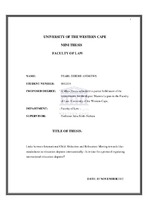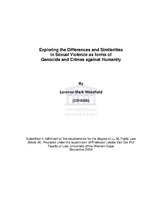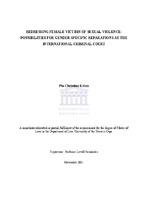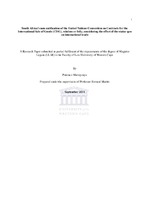| dc.contributor.advisor | Sloth-Nielsen, Julia | |
| dc.contributor.author | Andrews, Pearl Deidre | |
| dc.contributor.other | NULL | |
| dc.date.accessioned | 2014-03-06T10:15:26Z | |
| dc.date.available | 2013/03/25 | |
| dc.date.available | 2013/03/25 09:55 | |
| dc.date.available | 2014-03-06T10:15:26Z | |
| dc.date.issued | 2012 | |
| dc.identifier.uri | http://hdl.handle.net/11394/2914 | |
| dc.description | Magister Legum - LLM | en_US |
| dc.description.abstract | This by implication would mean that the best way to prevent child abduction is to desist from international marriages and moving abroad.The modern reality is that relationships are being formed internationally. In the same breath, relationships are easily un-formed and the family fractured. The emotional impact of any breakup is usually tense, and it follows by implication that this will be exacerbated if a child is involved. For reasons that will be expounded on in the thesis, many caregivers, usually mothers have opted to abduct their children. Some have opted to apply formally to relocate. Relocation disputes are widely regarded as one of the most controversial and difficult issues in family law internationally. These disputes usually arise pursuant to a relational breakdown, when the resident parent (usually the mother) seeks to relocate with the children either domestically or internationally. This causes a significant impact on contact arrangements with the other parent (usually the father). Depending on the country in which they find themselves and the laws applicable to relocation with the child, mothers are faced with the decision to remove the child either lawfully or wrongfully. International family law jurisprudence has been developed over time to assist with custody and relocation disputes. ‘Much has been written on the Hague Convention – its flaws and its successes, its effectiveness and utilization. This thesis aims to look specifically at relocation disputes within the context of international parental child abduction; more specifically, it sets out to explore whether there is a link between those phenomena, and whether the Hague Convention is sufficient for dealing with relocation disputes. I hope to make a convincing argument that if there were an international instrument regulating relocation, there would be uniformity and consistency. People’s confidence in the legal processes would be restored, motivating them to apply formally to relocate and, in doing so, the incidence of child abductions would be reduced. | en_US |
| dc.language.iso | en | en_US |
| dc.publisher | University of the Western Cape | en_US |
| dc.subject | Relocation disputes | en_US |
| dc.subject | International protocol/ instrument/treaty | en_US |
| dc.subject | International family law jurisprudence | en_US |
| dc.subject | Child abduction (Hague Convention) | en_US |
| dc.subject | Best interests of the child | en_US |
| dc.subject | Fundamental issues | en_US |
| dc.subject | Uniform and consistent approach (like-mindedness) | en_US |
| dc.subject | Cross-border relationships (international marriages (families) | en_US |
| dc.title | Links between international child abduction and relocation: moving towards likemindedness in relocation disputes internationally - Is it time for a protocol regulating international relocation disputes | en_US |
| dc.rights.holder | Copyright: University of the Western Cape | en_US |
| dc.description.country | South Africa | |




